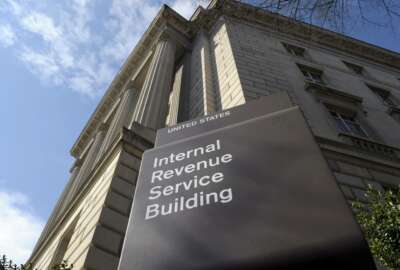Best listening experience is on Chrome, Firefox or Safari. Subscribe to Federal Drive’s daily audio interviews on Apple Podcasts or PodcastOne.
- Federal civilian employees will see bigger paychecks in 2023. President Joe Biden has made a 4.6% pay raise official for federal employees after signing an executive order. But that 4.6% pay bump is an average. Some feds may see slightly higher or lower raises depending on where they work. The actual pay raises for feds next year will range from about 4.4% to 5.2%. (Federal News Network)
- Employees at the National Archives and Records Administration will get more opportunities to work from home. NARA has signed a new memorandum of understanding with its union, the American Federation of Government Employees. The MOU makes all permanent agency employees eligible to telework up to five days per week. AFGE says the new agreement adds more flexibility to the workplace and is based on lessons learned from implementing full-time telework during the pandemic.
- Agencies are getting more time to digitize their paper records. The White House is giving agencies until the end of June 2024 to manage all of their permanent records in electronic formats The deadline had been set for Dec. 31 of this year. But the COVID-19 pandemic and other challenges led many agencies to fall behind on their digitization plans. Only about half of agencies were confident they would meet the end-of-year deadline, and many of them planned on asking for exemptions to the paperless records requirements. (Federal News Network)
- The Transportation Department will release $9 billion in funding to upgrade passenger rail services along the Northeast Corridor. These funds will be issued through a federal-state partnership program. According to the DOT, the Northeast Corridor carries 200 million commuters annually. Applications for the funding are due at the end of March.
- In an effort to hire and retain more child care workers, the Defense Department will raise the rates it pays for childcare, but military families will also take on some of the cost. The Child Development Program fee policy changes include the hourly rate going from seven to eight dollars per hour per child. The fee the DOD will pay community child care providers will go up from $1,500 per child per month to $1,700-dollars. Fees for child care depend on total family income and the DOD re-evaluates them every year.
- The Defense Department’s 2023 Cost of Living Allowance rates are out for the continental U.S., with New York City and Martha’s Vineyard, Massachusetts topping the list of highest priced areas. COLA rates offset living expenses for military service members in the countries’ most expensive areas. The rates are based on an index of transportation, goods and services, federal income taxes, sales taxes and miscellaneous expenses. Payments range from $33 to $59 per month for members with dependents, and from $22 to $45 per month for members without dependents.
- The National Reconnaissance Office has a new lead oversight official. The Senate voted to confirm Terrence Edwards as the inspector general of the NRO last week. Edwards most recently served as the chief of staff to the principal deputy director of national intelligence. He also had a stint as deputy general counsel for management in the Office of the Director of National Intelligence. Edwards is replacing Susan Gibson, the first presidentially-appointed and senate-confirmed IG for the NRO, who served from 2016 through this year.
Copyright
© 2025 Federal News Network. All rights reserved. This website is not intended for users located within the European Economic Area.


